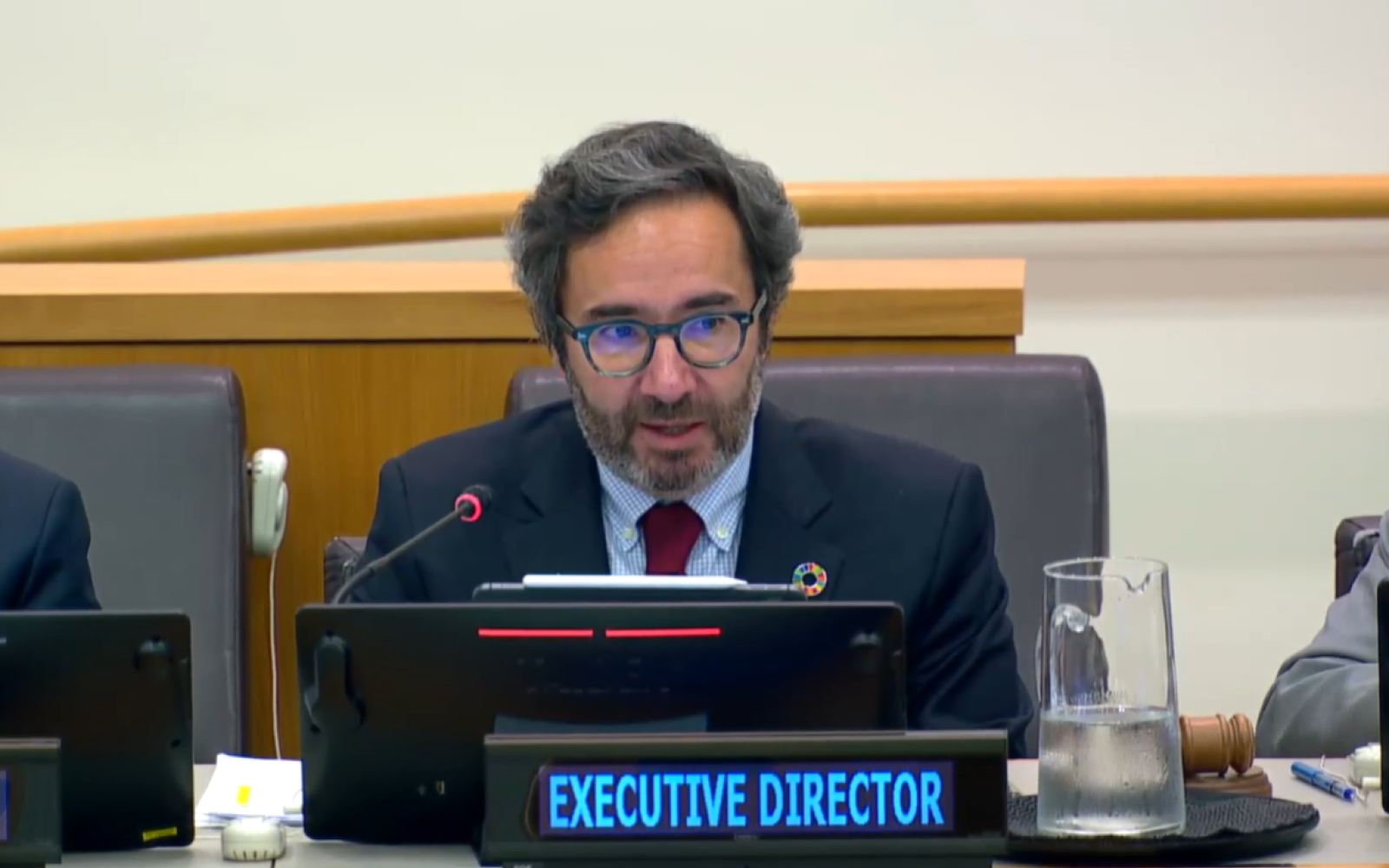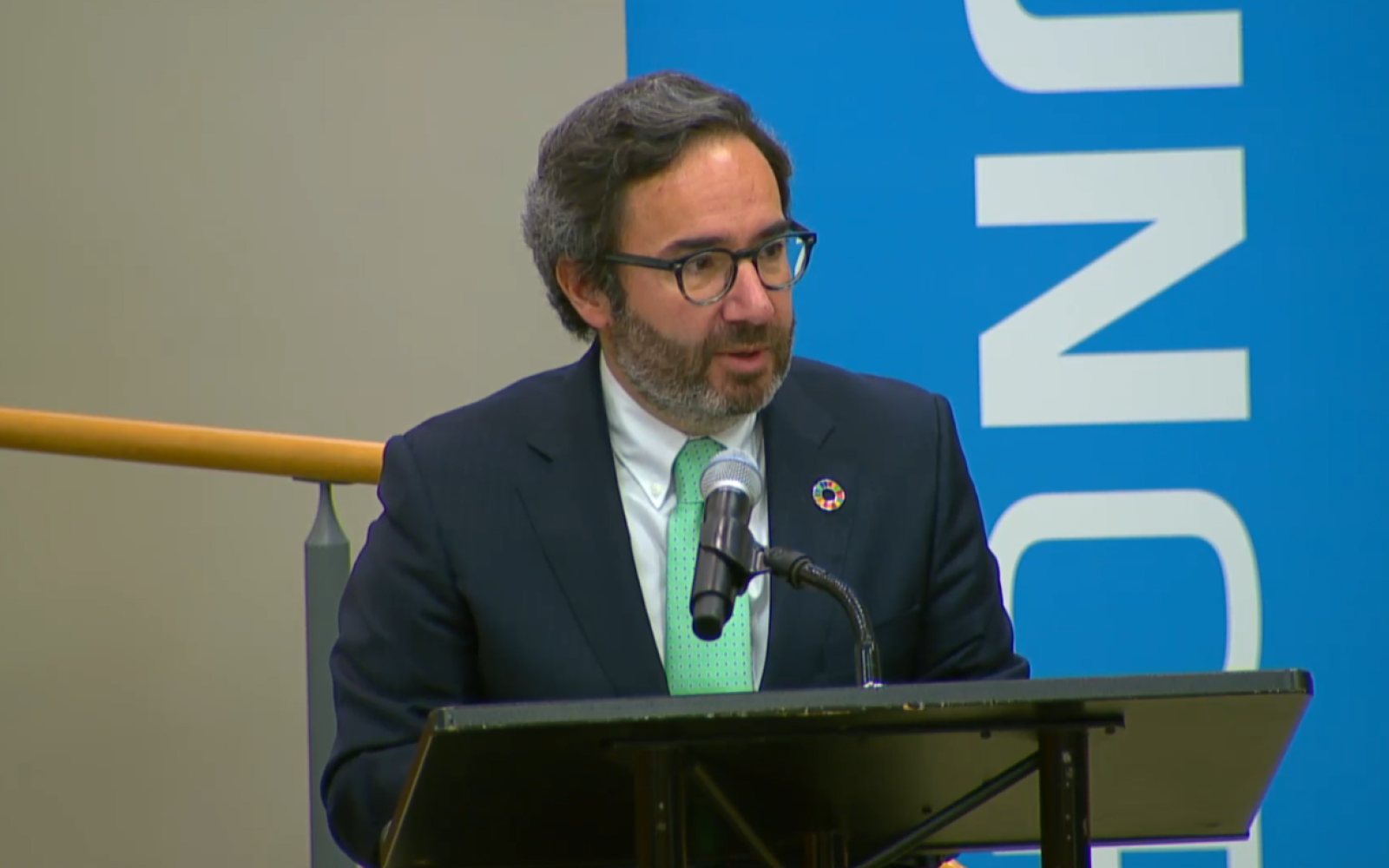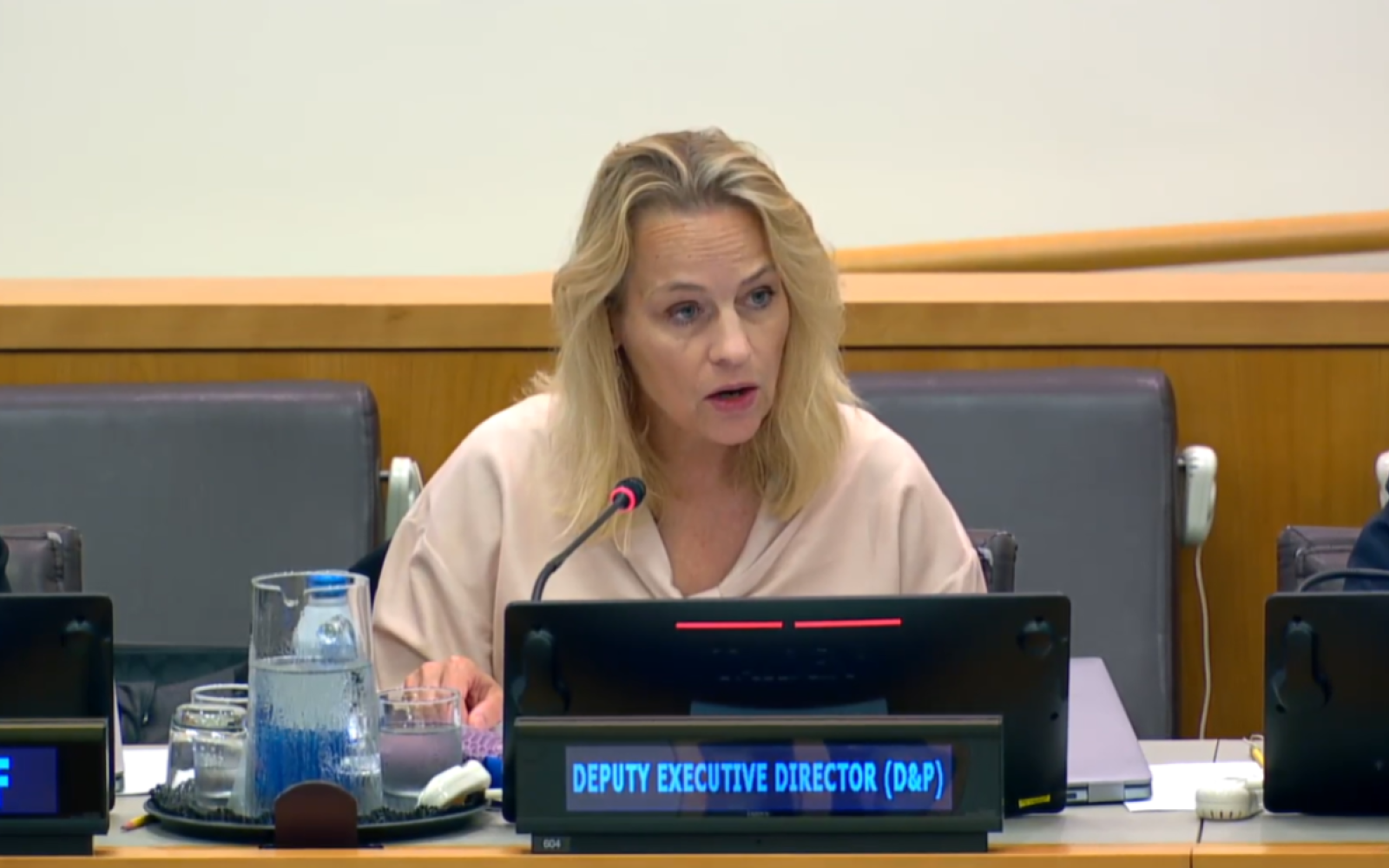The United Nations Office for Project Services (UNOPS)
Statement by UNOPS Deputy Executive Director to the Annual Session of the Executive Board 2024 – Interactive Session
Statement by Kirstine Damkjaer, Assistant Secretary-General and UNOPS Deputy Executive Director – Delivery and Partnerships, to UNDP/UNFPA/UNOPS Executive Board annual session during the interactive session on ending the cycle of climate-induced disaster with sustainable, resilient and inclusive infrastructure - 7 June 2024
[Check against delivery]
Excellencies, honorable members of the Executive Board, colleagues,
It is a pleasure to be here today, in this important conversation on the need for sustainable, resilient and inclusive infrastructure, as a key to achieving sustainable development and peace.
This is a subject that I have worked on in detail over the past two decades, where I have focused on infrastructure, development finance and project implementation, across a number of leadership roles at the World Bank, International Finance Corporation (IFC), and the Africa Finance Corporation, and now over the past two weeks at UNOPS.
Allow me to build on the very important points that our Executive Director raised in his remarks, which is - how we can use our resources strategically, to create resilient infrastructure for a prosperous future.
Our ED painted this picture clearly: there is an enormous infrastructure gap and we must address it. The gap consists of both the need to build new infrastructure in support of communities, and to reinforce existing infrastructure to withstand the worsening impacts of climate change and avoid disruptions for communities. Both are needed to create resilient communities.
Allow me to elaborate this through an example from our work to contribute to infrastructure for resilience and highlight some important enabling factors, which are both critical to help address the infrastructure gap and illustrate UNOPS core capabilities.
The recently completed Zimbabwe Idai Recovery Project (ZIRP), was a unique partnership between the World Bank and the UN to address the early and medium-term resilient disaster recovery needs of communities in Zimbabwe who were affected by Cyclone Idai. It was a four-year project, where UNOPS managed a $72 million World Bank fund, working together with UNICEF, FAO, WHO, WFP, IOM, UNFPA and UNESCO. With all of us “delivering as one” to build the foundations for regional recovery and longer-term resilience.
Some context on the scale of the destruction that called for this partnership to support the government:
When Cyclone Idai hit Zimbabwe in March 2019, it uprooted communities, damaged vital infrastructure, and destroyed livelihoods. About 50,000 households were destroyed and more than 60,000 people were displaced. Nine districts in the country faced up to $622 million in damages.
Here, the approach was to help the community not just to recover what was lost - but be able to mitigate future shocks. The many partners involved here - both local and international - understood that we need a holistic approach to build resilience, one that has a focus on reducing climate risks while promoting gender equality and inclusive climate action.
And through that approach, these are some of their achievements:
The project led to the rehabilitation of health facilities, water systems and sanitation facilities, schools, irrigation schemes, micro-watersheds and roads that connected people to services – all infrastructure that's vital to the more than 346,000 people that call the impacted communities home.
It created integrated health services and gender-based violence response for more than 672,000 people, including more than 3,600 internally displaced people.
It created local jobs, thus helping build community capacity and resilience by providing necessary infrastructure development skills. Labor-intensive, community-focused infrastructure projects created job opportunities for more than 5,200 community members, nearly half of them women.
It involved training for local authorities on the operation and maintenance of the infrastructure that was built, ensuring it remains in good working order for communities.
And crucially, the partners involved worked closely with Zimbabwe’s national and local government, to build stronger disaster risk governance and preparedness. This involved developing early warning and risk information systems to inform disaster risk preparedness and contingency planning.
The Zimbabwe Idai Recovery Project is a good example of how an infrastructure gap can be successfully addressed in one community. I would like to highlight a few factors that enabled this, which are part of our toolkit for all infrastructure projects and are critical to address the infrastructure gap across communities and in particular fragile and conflict-affected areas.
To ensure that the project laid the foundation for resilience to future shock and stresses, it involved a comprehensive climate hazard and risk assessment. It made sure to engage the local community’s views via a participatory design process. This approach informed the climate resilient and inclusive design and construction of community schools, roads, health facilities, irrigations and markets.
Another key aspect of this work, worth highlighting was its reliance on data, to support decision-making.
Here, data on the movement, needs and vulnerabilities of displaced persons was monitored, with the information taken into consideration for activities implemented under ZIRP.
This was very helpful, for example, in the context of the COVID-19 pandemic, where several implementing organizations shifted some of their existing funding to activities to help Zimbabwe tackle the pandemic. Data on health risks associated with COVID-19 was crucial to shaping these decisions.
Having reliable data is crucial to all aspects of decision-making. Time and time again, we have seen that the lack of high-quality data can constitute a major stumbling block for governments and other stakeholders when planning infrastructure projects.
This is an area where UNOPS works closely with many partners, to enable evidence-based infrastructure planning, supporting them to take action.
For example, together with UNDESA, we are working to support six countries, (Costa Rica, The Gambia, Kenya, Zanzibar in Tanzania, Nepal and Laos) to improve their Infrastructure Asset Management (IAM) practices. Part of this work - which is funded by the UN’s Peace and Development Fund - involves supporting governments to improve their collection, management and use of data to inform infrastructure decisions for resilient outcomes. The idea is that reliance on quality data allows us to make informed decisions to improve resilience, both for infrastructure assets and the communities that they serve. This way, we can ensure a return on investment.
Honorable representatives,
We know that countries face an uphill battle in creating the infrastructure that is needed to deliver on the Sustainable Development Goals. The needs are mounting - and nowhere more so than in fragile and conflict-affected contexts struggling, with limited resources, to cope with a changing climate.
So we have a moral - and financial - imperative, to make the best use of the resources available to us, to develop not just resilient infrastructure, but also infrastructure for resilience.
This means a move away from a traditional silo-based approach to infrastructure, to one that recognizes the interdependence of infrastructure systems across cities, islands, countries and regions.
It means decisions and actions that take into account a diverse range of social, environmental and economic contexts and their associated risks. Decisions that are evidence-based, informed by quality data on a range of issues, including demographic, economic and climate change risks.
It means mainstreaming conflict and gender sensitive principles across our projects.
It means involving local stakeholders at all stages of project design and delivery,
And it means integrating local capacity building into projects.
This is how we strive to implement our projects at UNOPS - building on over 25 years of operational experience working in challenging contexts.
Together, we can create sustainable, inclusive and resilient infrastructure, for a better future for people and the planet.
UNOPS stands ready to support our partners in this effort.
Thank you.










